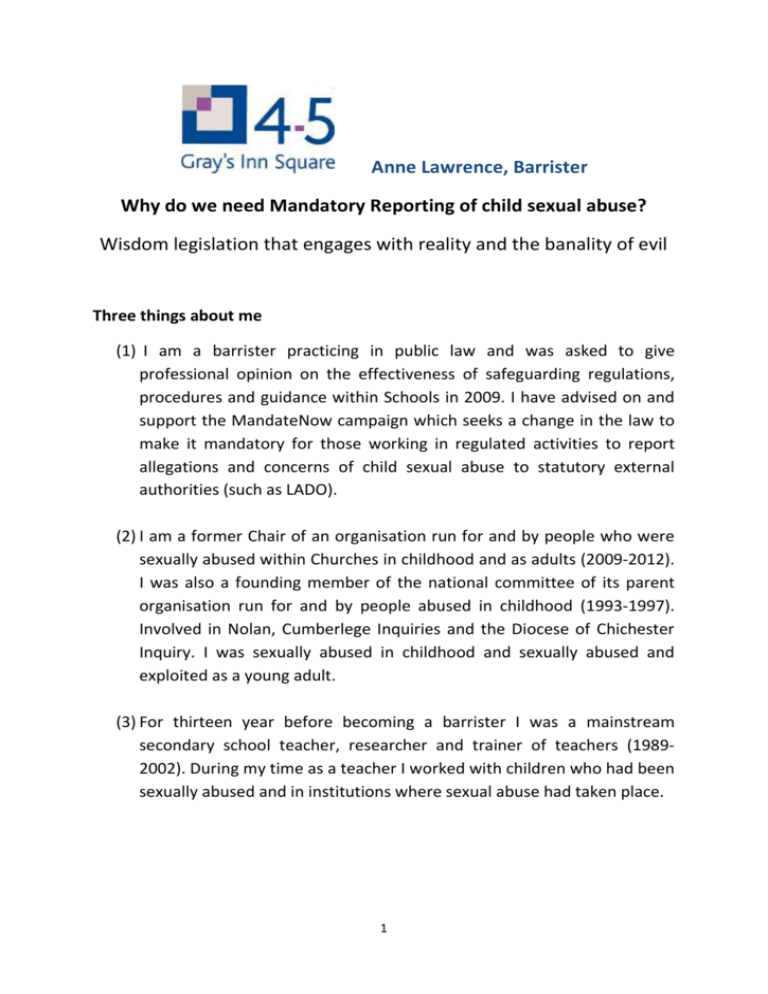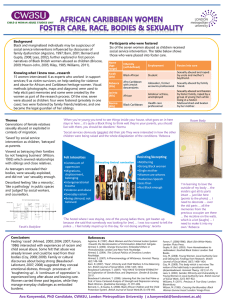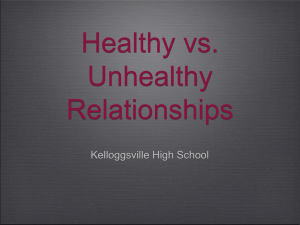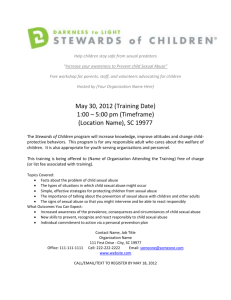
Anne Lawrence, Barrister
Why do we need Mandatory Reporting of child sexual abuse?
Wisdom legislation that engages with reality and the banality of evil
Three things about me
(1) I am a barrister practicing in public law and was asked to give
professional opinion on the effectiveness of safeguarding regulations,
procedures and guidance within Schools in 2009. I have advised on and
support the MandateNow campaign which seeks a change in the law to
make it mandatory for those working in regulated activities to report
allegations and concerns of child sexual abuse to statutory external
authorities (such as LADO).
(2) I am a former Chair of an organisation run for and by people who were
sexually abused within Churches in childhood and as adults (2009-2012).
I was also a founding member of the national committee of its parent
organisation run for and by people abused in childhood (1993-1997).
Involved in Nolan, Cumberlege Inquiries and the Diocese of Chichester
Inquiry. I was sexually abused in childhood and sexually abused and
exploited as a young adult.
(3) For thirteen year before becoming a barrister I was a mainstream
secondary school teacher, researcher and trainer of teachers (19892002). During my time as a teacher I worked with children who had been
sexually abused and in institutions where sexual abuse had taken place.
1
Three things I have learnt
(1) It was Hannah Arendt, a German Jewish woman who left Germany when
the persecutions began in the 1930s, who described what she heard at
the Eichmann Trial as ‘the banality of evil’ (1962). The evidence did not
disclose acts of great evil but rather the daily unquestioned acceptances
of orders, the careless indifference and unthinking actions of soldiers,
officers and state administrators, and the turning away from, minimising
and denial of what was happening by many millions of ordinary people
focused on their own needs and aspirations. It is these dynamics that
enable evil to happen in the midst of ordinary life.
(2) Teachers and social workers, nurses, doctors and police officers, are
ordinary people working in front line services often undervalued and
over stretched, earning a salary to pay the mortage/rent, to feed and
clothe their children, to pay ever increasing bills, and save for
retirement, a holiday - with their own needs and aspirations. Under
pressure to fulfil or conform to ever changing professional targets and
priorities they are often torn between the competing demands of their
professional and personal commitments. They are not heroes, they are
human beings, and when things go wrong they deserve our compassion
not our condemnation.
(3) To be sexually abused in childhood is devastating. It is a shattering
betrayal of trust which causes profound cognitive confusion,
psychological harm and emotional disturbance to the child. Child sexual
abuse is an act of evil; it is about turning the child into an object over
which power can be exerted for the gratification of the perpetrator.
Those around the child are often groomed and manipulated by the
perpetrator to enable the abuse to take place & to silence concerns and
allegations. It is a hate filled crime committed. The impact on the victim
can be lifelong and the cost to society is incalculable: (research findings
on physical and mental health, social care, unemployment,
homelessness, crime, prison, drug and alcohol addiction, prostitution. . .)
Research has found that between 10-16% of those surveyed had been
sexually abused in childhood (NSPPC research 2000 and 2011).
2
Three reasons why mandatory reporting is required
(1) There is currently no legal requirement for anyone to report known or
suspected cases of child sexual abuse to LADO or the police (Kier
Starmer, BBC Panorama November2013). We are left wondering how
many lawyers have advised head of institutions where children were
abused, that there is no legal requirement to report even known abuse.
Statutory legislation and guidance merely provides that if a named
person within an institution where regulated activities take place has
reason to believe that a child has been harmed or may be at risk of
significant harm then s/he should report the case to the relevant
external agency. It is for the named person within the institution/
organisation to determine whether any allegation or concern raised
meets the ‘threshold’ for reporting. Professional Codes of Conduct and
Guidance also provide that members of the profession should report
where they suspect a child has been or is at risk of significant harm.
Government responses to the MandateNow campaign have included the
banal statement that there is no need for a mandatory duty to report,
because if a person within an institution or organisation to which
relevant statutory guidance applies does not report when they know or
reasonably believe that abuse has taken place the institution can be
Judicially Reviewed and/or the person could be disciplined.
Who would bring the JR claim? The child, the parent, and when will they
do it (within 3 months), and how likely is it to be successful? JR is a
wholly unrealistic and ineffective remedy for the failure to report abuse.
And whilst a professional body can discipline and even remove a person
who breaches professional safeguarding duties, such as the HT in the Hill
Side First School case (SCR 2012) this will only ever happen years later
when the perpetrator has been convicted and a serious case review has
taken place. The harm has been done, a child and possibly many more,
will have suffered abuse and no one did anything Again it is not an
3
effective response. How many professionals have ever faced disciplinary
proceedings for failing to report cases of child sexual abuse?
Recent cases best illustrate the ineffectiveness of current guidance to
protect children; Hill Side First School (2011), Stanbridge Earl School
(2011), Bishop Bell School (2012), St Benedict’s School Inquiry (2011),
Downside School Inquiry (2012); all cases where child abuse continued
for a considerable period of time with the knowledge of teachers, Head
teachers and even the Governors.
(2) The current statutory and professional guidance across regulated
activities assumes a level of personal courage and a capacity for
objective decision-making that is simply not realistic and fails to engage
with institutional and social dynamics and the competing professional
and personal demands of ordinary people with families to support,
careers to pursue and professional/institutional targets and policies to
be met, all of which impact adversely on the likelihood of reporting.
There are myriad reasons why people who are working in regulated
activities do not report what they know or suspect, have been told or
even witnessed. If, as in the Hill Side First School case, a teacher sees a
colleague abusing a child often the first reaction is to question what was
seen, to doubt what it means, and to attempt to rationalise, minimise or
deny that it was what she thought. What would it mean if a colleague, a
friend, a parent was sexually abusing a child? What would happen to the
colleague, the parent or the child? What if the witness is wrong? Then at
a practical level, if a child discloses something to a teacher, how long will
s/he have to hang around to wait for social services, what if the child is
lying, why should she have to deal with this, who will collect her
children, it’s someone else’s responsibility, what if he is blamed for
overreacting and loses his job? Meanwhile the head of the school,
Diocese, hospital . . . has other concerns also; institutional reputation,
friendship, staffing issues, the fact that this is the third time someone
has made an allegation against the same teacher and he didn’t act
4
before, it may be a mistake or misunderstanding, this is the second
person the child made allegations about, what harm really, it was only
touching, we’re all human, maybe he just needs a break. Files are
suddenly ‘edited’ or destroyed and cases are covered up (Hill Side School
2011, Bishop Bell School 2012, Diocese Chichester Prebendal School
Inquiry 2002, Orchard View Inquiry 2013)
These responses are seen time and again in recent serious case reviews.
Under the current safeguarding regime it takes personal courage to
report suspected and known cases of child sexual abuse regardless of
the consequences. And even when a teacher, nurse, social worker does
report to the named person, if nothing happens what is s/he to do?
Report again and risk being called obsessed or a trouble-makers.? What
if she goes directly to the police behind the back of her managers, this
will certainly cause trouble, especially when, as in the vast majority of
reported cases of child sexual abuse (over 95%), there is no prosecution
or conviction and nothing happens to the alleged abuser (Orchard View
Care Home case 2013, Peter Connolly SCR GOSH 2010).
It is simply not good enough for Government ministers and permanent
secretaries to say that professionals will always act in the interests of the
child. That banal statement denies the vulnerabilities and competing
professional and personal priorities of those working in regulated
activities and the social and institutional complexities of child abuse
cases which make all involved question what they know, the firmness of
the ground upon which they stand and the goodness of others.
Whilst Government ministers rely on bland assertions that professionals
are reporting all the time, they fail to reflect on the fact that the
reported cases they refer to must be a fraction of the estimated 5% of
child abuse cases ‘detected’ (Equality and HR Commission: How Fair is
Britain Report 2011). Given that over 95% of children regularly attend
school, are registered with the health services and the most vulnerable
are registered with social services, how many people working in
5
regulated activities are not listening, not responding or are not reporting
what they suspect, what they have seen and what they have been told?
(3) It has been argued time and again by well meaning safeguarding and
child protection professionals that there just needs to be better training.
I would say that this is crucial, and that it needs to be training which
engages with the need for reflective practice, listening to intuitive
concerns, and understanding the institutional and social dynamics,
competing prioritises and complex feelings that arise when faced with
such difficult cases, rather than superficial training which focuses on
what child abuse is, the signs to look out for and the institutional
procedures to follow which has so characterise the training offered.
However the best support you can give to a competent professional
working in a regulated activity, with children, a mortgage, child care bills,
juggling professional and family commitments, looking for promotion,
with plans made for the future money she will earn, is mandatory
reporting legislation which cuts across the institutional, social and
personal dynamics, and cuts across the fear of getting it wrong. Such
legislation would enable a professional to say okay the child has told me
this, or I have seen that and by law I must report to the named person
and he must report it to the external agency. I will do this now on the
statutory reporting form, and the institution will cover any additional
child care whilst I do so as it’s a statutory duty related to my job, I will
not ‘be blamed’ because I am required to report what I’ve been told,
seen or suspect, and I will check to make sure that it has been reported
externally as required by law. That’s what I was told in the excellent
safeguarding training we received.
Legislation that makes the reporting of known or suspected child sexual
abuse reporting mandatory provides the support and protection people
need to do the right thing when faced with the myriad and complex
personal, professional and social dynamics that are engaged when cases
of child abuse arise; they cannot be blamed, criticises, or pressurised
into not reporting or not checking when a report has been made. They
6
are empowered and enabled by such legislation and absolved of the
need to know for sure before acting. They are just following the law and
doing the right thing.
Anne Lawrence (10th December 2013)
7







